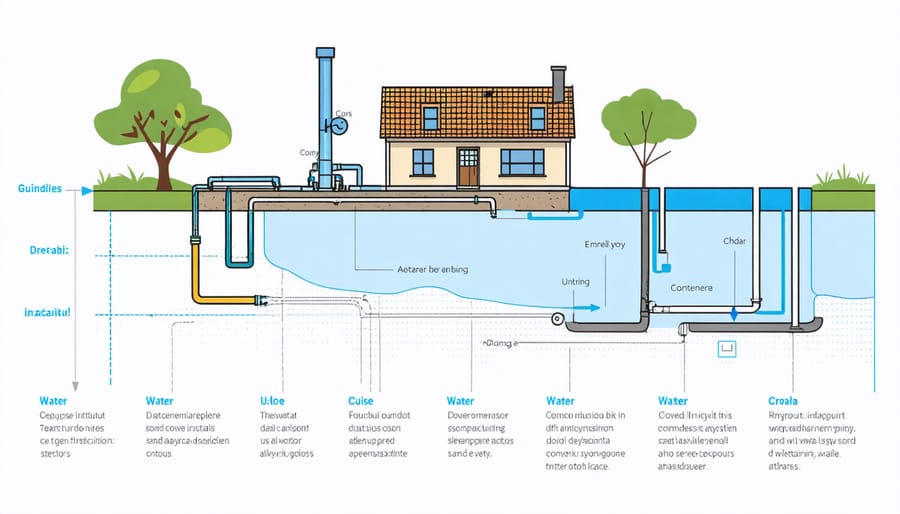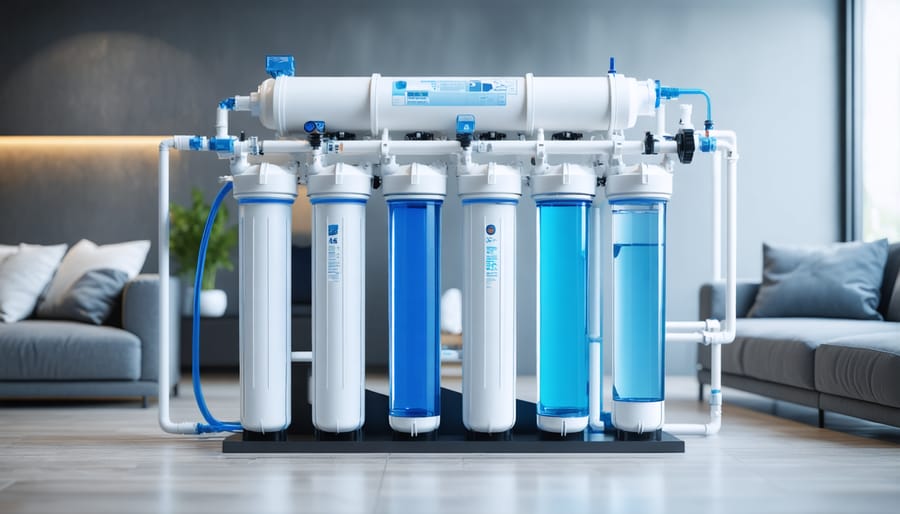Well water serves as a primary drinking source for over 43 million Americans, yet many homeowners wonder about its safety and health implications. Unlike city water, well water comes directly from underground aquifers, offering a natural, mineral-rich alternative that’s free from municipal treatment chemicals. However, this direct-from-earth source also brings unique considerations for your family’s health and safety.
Regular testing reveals that properly maintained well water often contains beneficial minerals like calcium, magnesium, and potassium – essential nutrients that support bone health, muscle function, and overall wellness. Yet, without proper monitoring and maintenance, well water can harbor concerning contaminants such as bacteria, heavy metals, or agricultural runoff that could impact your health.
The key to enjoying healthy well water lies in understanding your system, implementing regular testing protocols, and maintaining proper filtration methods. Whether you’re considering switching to well water or already rely on it, knowing the facts about its health implications empowers you to make informed decisions about your water consumption and treatment needs.
This comprehensive guide explores the health benefits and potential risks of well water, providing you with practical solutions to ensure your family enjoys safe, beneficial drinking water straight from the earth.

Understanding Your Well Water Composition
Natural Minerals: The Good Side
Well water contains a treasure trove of naturally occurring minerals that can contribute to your overall health and help transform your home into a natural wellness sanctuary. These minerals, including calcium, magnesium, and potassium, are essential for various bodily functions and often come in more bioavailable forms than synthetic supplements.
Calcium from well water helps maintain strong bones and teeth, while magnesium supports muscle function and energy production. Potassium aids in maintaining healthy blood pressure levels and proper heart function. Iron, another common mineral in well water, is crucial for blood health and oxygen transport throughout your body.
Unlike treated city water, which often has minerals removed during processing, well water retains these beneficial compounds in their natural state. This can make well water an excellent source of daily mineral intake, especially in areas where the groundwater naturally contains high levels of these beneficial elements. However, it’s important to have your well water tested regularly to ensure the mineral content remains within healthy ranges.
Common Contaminants to Watch For
While well water can be perfectly safe, it’s important to be aware of common contaminants that might affect your water quality. Naturally occurring minerals like iron and manganese can cause staining and odd tastes but are generally harmless. However, some substances require closer attention.
Bacteria and microorganisms, particularly E. coli and coliform bacteria, can enter wells through surface runoff or damaged well casings. Nitrates, often from fertilizers and septic systems, pose special risks to infants and pregnant women. Heavy metals like lead and arsenic can occur naturally in groundwater or leach from old plumbing.
Agricultural areas might have pesticides and herbicides in groundwater, while industrial zones could introduce chemicals like volatile organic compounds (VOCs). Hard water minerals, though not harmful, can leave deposits on fixtures and affect appliance efficiency.
The good news? Regular testing can identify these contaminants early, and most can be effectively treated with the right filtration system. As a well owner, scheduling annual water quality tests is your best defense against potential contamination issues.
Health Benefits and Risks
Potential Health Advantages
Well water, when properly maintained and tested, can offer several notable health advantages as part of creating a healthier living space. Unlike city water, well water is naturally filtered through layers of soil, rock, and sand, which can enrich it with essential minerals like calcium, magnesium, and potassium. These minerals not only contribute to better taste but also support various bodily functions.
One significant benefit is that well water is typically free from artificial additives like chlorine and fluoride, making it an excellent choice for those seeking a more natural water source. The mineral content can contribute to stronger bones and teeth, improved cardiovascular health, and better digestive function.
Well water often contains beneficial bacteria that can help strengthen your immune system naturally. These microorganisms, when present in safe amounts, can contribute to a more robust gut microbiome. Additionally, because well water comes directly from your property, you have complete control over its treatment and testing, allowing you to maintain optimal mineral levels while ensuring safety.
For those concerned about environmental impact, well water is also a sustainable choice. It reduces reliance on municipal water systems and eliminates the need for plastic bottled water, making it both eco-friendly and cost-effective in the long run.
Health Considerations and Precautions
While well water can be perfectly safe and contribute to your home’s well-being sanctuary, there are important health considerations to keep in mind. Regular testing is crucial, as contaminants like bacteria, nitrates, and heavy metals can be present without any noticeable taste or smell.
Pregnant women, elderly individuals, and young children are particularly vulnerable to waterborne contaminants. If your well water shows high levels of nitrates, it could pose risks to infants under six months old. Similarly, elevated levels of heavy metals like lead or arsenic require immediate attention and treatment.
Consider installing a whole-house filtration system to address potential contaminants. UV filters can effectively eliminate harmful bacteria, while reverse osmosis systems remove a wide range of pollutants. Keep your well cap properly sealed and maintain a safe distance between your well and potential contamination sources like septic systems or agricultural areas.
If you notice changes in your water’s taste, smell, or appearance, don’t ignore them. These could be signs of contamination that require professional inspection. Also, maintain detailed records of water testing results and any treatments or maintenance performed on your well system. This documentation helps track changes over time and ensures your family’s continued safety.
Testing and Maintenance
Regular Testing Schedule
Regular well water testing is essential for ensuring your family’s safety and maintaining a healthy water supply. The EPA recommends testing your well water at least once a year for basic contaminants, but certain situations may require more frequent testing.
Here’s a practical testing schedule to follow:
Annual Tests (Every Year):
– Total coliform bacteria
– Nitrates
– Total dissolved solids
– pH levels
– Any contaminants of local concern
Every 2-3 Years:
– Lead
– Copper
– Iron
– Manganese
– Sulfate
Additional testing is recommended if you notice:
– Changes in water taste, odor, or color
– Recurring gastrointestinal illness
– Nearby construction or mining activity
– After flooding or heavy storms
– Following well repairs
Consider more frequent testing if you have:
– Pregnant women or infants in the household
– Family members with compromised immune systems
– Recent chemical spills near your property
Keep a detailed record of all test results and schedule reminders for future tests. Many local health departments offer testing services, or you can use state-certified laboratories for comprehensive analysis. Remember, consistent testing is your best defense against potential water quality issues.

Maintaining Water Quality
Keeping your well water healthy requires regular maintenance and attention to detail. Start by testing your water quality at least once a year through a certified laboratory. This helps you catch potential issues before they become serious problems.
Install a reliable filtration system appropriate for your specific water composition and maintain it according to manufacturer guidelines. Replace filters on schedule and keep records of all maintenance activities.
Create a protective barrier around your well by maintaining proper drainage and keeping the area clear of debris, chemicals, and potential contaminants. Ensure your well cap is secure and inspect it regularly for cracks or damage.
Consider these essential maintenance tasks:
– Inspect the well casing annually for cracks or damage
– Clean the area around your well regularly
– Test after heavy storms or flooding
– Keep detailed records of all water tests
– Schedule professional inspections every 3-5 years
Watch for warning signs like changes in water taste, color, or odor. If you notice any changes, get your water tested immediately. Remember that prevention is always easier and more cost-effective than dealing with contamination issues later.
Be proactive about maintaining your septic system, as it can directly impact your well water quality. Keep hazardous materials, fertilizers, and pesticides far from your well area to prevent groundwater contamination.
Home Treatment Solutions

Filtration Systems
Ensuring your well water is safe to drink starts with choosing the right filtration system. Several effective options can help remove contaminants and improve water quality, giving you peace of mind about your family’s health.
Whole-house filtration systems are particularly popular among well owners. These systems treat water at the point of entry, ensuring clean water flows through every tap in your home. They typically use multiple stages of filtration, including sediment filters to remove particles and activated carbon to improve taste and odor.
Reverse osmosis systems are excellent for drinking water purification. These advanced systems can remove up to 99% of dissolved solids, including harmful contaminants like lead, arsenic, and bacteria. While they’re usually installed under the kitchen sink, they provide incredibly pure drinking water for your family.
UV filtration systems are particularly effective against bacteria and viruses. They use ultraviolet light to neutralize harmful microorganisms without adding chemicals to your water. This makes them an excellent addition to other filtration methods, especially if bacterial contamination is a concern in your area.
Water softeners are another important consideration for well water, as they help remove excess minerals that cause hard water. This not only improves water quality but also protects your appliances and plumbing from mineral buildup.
Remember to maintain your filtration system regularly and replace filters as recommended by the manufacturer. This ensures optimal performance and continued protection for your family’s water supply.
Water Softeners and Purifiers
When it comes to ensuring your well water is safe and enjoyable, water softeners and purifiers can be game-changers. Water softeners tackle hard water issues by removing excess minerals like calcium and magnesium, which can leave spots on dishes and scale buildup in pipes. This not only protects your appliances but also makes your water feel smoother and more pleasant for everyday use.
For comprehensive water treatment, consider a multi-stage purification system. These systems typically include sediment filters to remove particles, activated carbon filters to improve taste and remove chlorine, and UV sterilizers to eliminate harmful bacteria. Some homeowners opt for reverse osmosis systems, which can remove a wide range of contaminants, including heavy metals and dissolved solids.
Choose treatment options based on your specific water quality concerns. If you’re dealing with iron stains, an iron filter might be your priority. For bacterial concerns, a UV system could be essential. Remember that no single solution fits all situations – your choice should depend on your water test results and household needs.
Regular maintenance is crucial for these systems to work effectively. Set reminders to replace filters, add softener salt, and schedule professional check-ups. While the initial investment might seem significant, the long-term benefits to your health, home, and appliances make water treatment systems a worthwhile consideration for any well owner.
Making the Right Choice for Your Home
Making the switch between well water and municipal water is a significant decision that impacts your home’s status as a personal wellness sanctuary. To make an informed choice, consider these key factors:
First, evaluate your well water quality through comprehensive testing. If results show consistent, high-quality water with minimal contaminants, maintaining your well system might be your best option. However, if tests reveal ongoing issues or concerning levels of minerals or bacteria, municipal water could provide peace of mind.
Consider your location and lifestyle. Rural areas often make well water a practical choice, while urban settings typically offer reliable municipal services. Factor in your comfort level with system maintenance – well systems require regular upkeep and monitoring, while city water transfers this responsibility to local authorities.
Financial implications play a crucial role. While well water eliminates monthly water bills, factor in maintenance costs, testing fees, and potential equipment replacements. Municipal water comes with predictable monthly expenses but fewer maintenance responsibilities.
Think about your property’s resale value. Some buyers prefer municipal water’s convenience, while others value the independence of well systems. Research local real estate trends to understand how your choice might impact future sales.
Your decision should align with your household’s specific needs. Consider family size, water usage patterns, and any health concerns that might influence water quality requirements. Remember, both options can provide safe, clean water when properly maintained and monitored.
Well water can be a healthy and sustainable drinking water source when properly maintained and monitored. Regular testing, appropriate filtration systems, and routine maintenance are key to ensuring your well water remains safe for consumption. While well water often contains beneficial minerals and is free from municipal treatment chemicals, it’s essential to stay vigilant about potential contaminants and address any issues promptly.
Remember to test your water annually, install recommended filtration systems, and keep detailed maintenance records. If you’re unsure about your well water quality, don’t hesitate to consult with local water quality experts or your health department. With proper care and attention, your well can provide clean, healthy water for years to come, giving you peace of mind about your family’s water supply.
